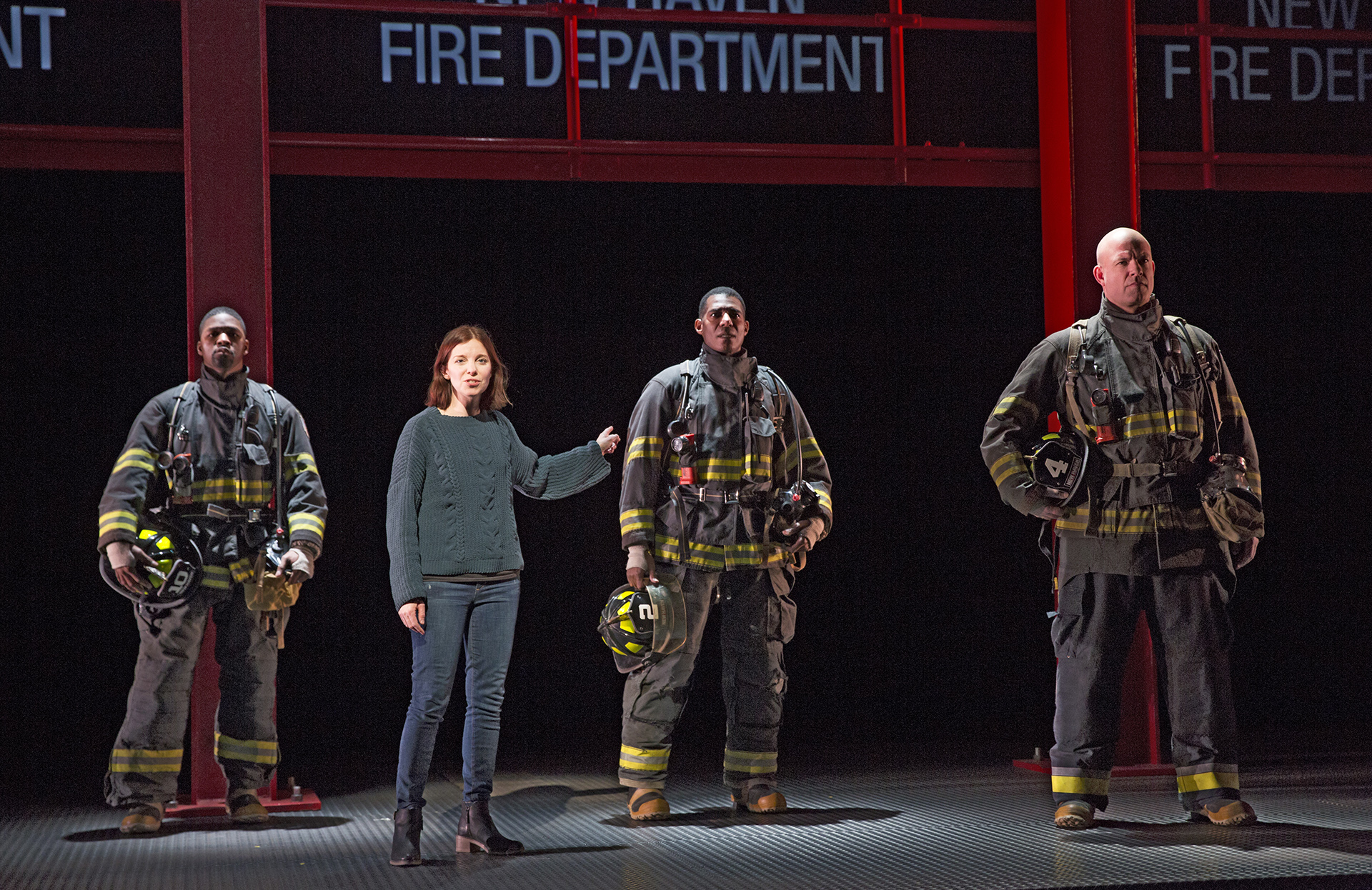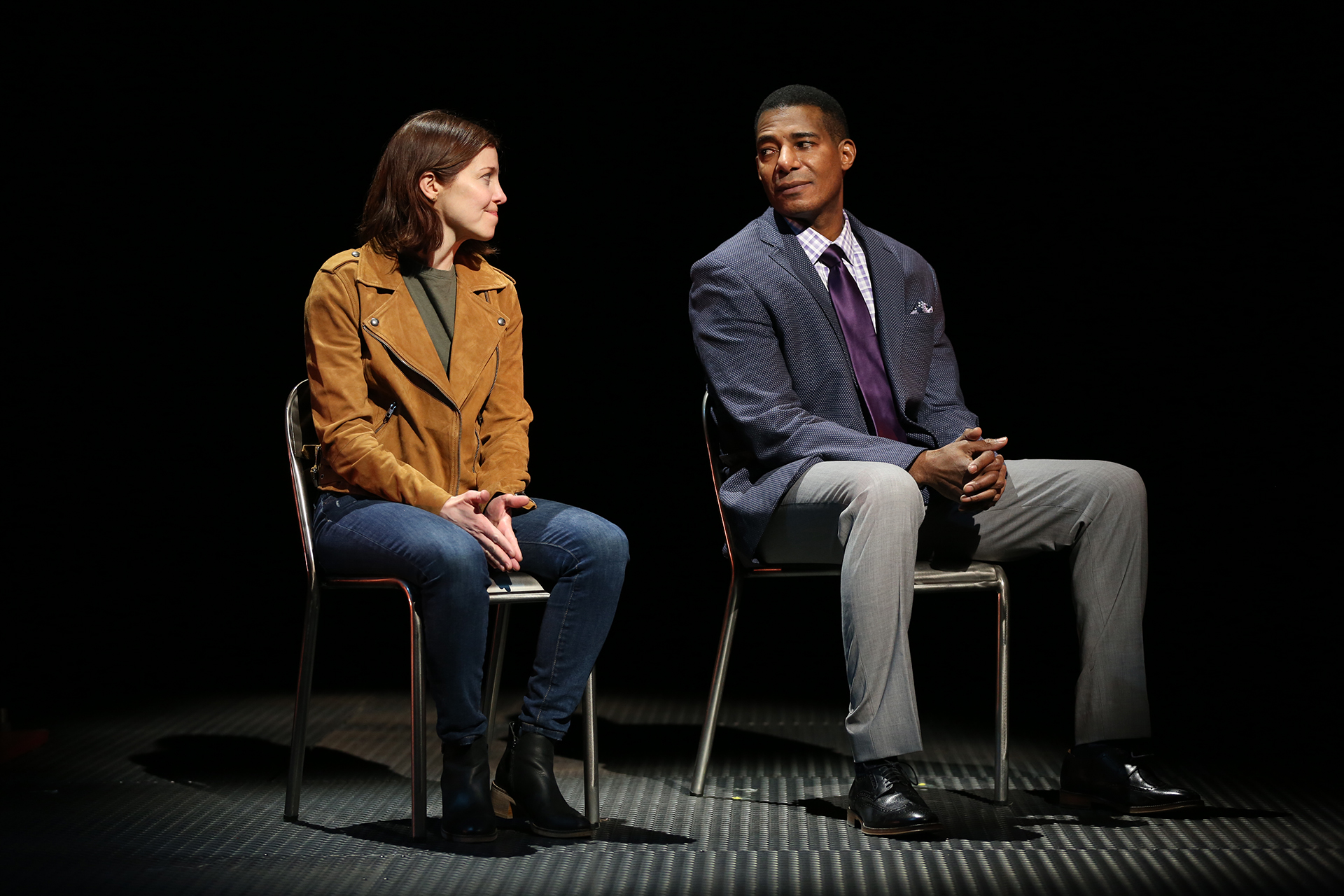Review of Good Faith, Yale Repertory Theatre
The case: Ricci vs. DeStefano was a lawsuit brought by twenty New Haven firefighters against the city for not following through on the results of a promotion exam, administered in 2003. The city, dismayed that so few firefighters of color scored in the top ranks, chose to throw out the results, claiming the test was biased. The city’s decision was twice upheld but then, heard by the U.S. Supreme Court, the case was decided for the firefighters in 2009, in a 5-4 decision. The suit’s victory seems to indicate that even whites can be discriminated against, since the case involved Title VII of the Civil Rights Act of 1964. The act aims to prevent any employer from using race, color, religion, sex, or national origin as a factor in hiring, promoting, or dispensing other work-related benefits. While generally seen as a means of fighting against discrimination arising from factors irrelevant to a given job, the article can also make a judgment call—like throwing out the results of a test deemed unfair—an act of prejudicial discrimination, rather than of a more neutral “discrimination,” i.e., determining whether a test serves its proper function. The ambiguous space between discriminating between applicants based on accomplishment (e.g., scoring high in a test) and discrimination as upholding social inequity or bias might be the realm of philosophy. In the U.S., it’s the realm of the legal profession.
Fine, but is it the stuff of drama? Certainly, tempers flare at such topics, and voices get raised, there may even be threats of violence or of additional lawsuits, but is that reason enough for theater to get involved? Apparently, yes. Yale Repertory Theatre, with the Binger Center for New Theatre, commissioned playwright Karen Hartman, a Yale School of Drama alum, to create a play about the case and its effects. A task that entailed many interviews with principal figures in the events and with many other New Haven citizens. The result, Good Faith: Four Chats about Race and The New Haven Fire Department, is playing at the Yale Repertory Theatre through February 23, directed by Tony-Award-winning director Kenny Leon with an engaging cast.
The play: The subtitle is important because the play is not about the case directly; the “chats” are meant to emulate and stimulate a collective sense of unease about how often race is generally made all-too-relevant in our society. On a spare stage graced by Stephanie Osin Cohen’s set design, a stylized firehouse, and featuring the welcome visual interest of Zachary Borovay’s projections, Writer (Karen Heisler) interacts with, mainly, Frank (Ian Bedford), based on the white man whose name appears in the case as plaintiff, Mike (Billy Eugene Jones), based on Mike Briscoe, Tyrone (Rob Demery), based on Tyrone Ewing, both African Americans who took the contested test but did not score high enough for immediate promotion, and Karen (René Augesen), based on Karen Torre, the attorney who took the case to the Supreme Court and won. Each actor, but for Heisler, plays ancillary roles as well. Frank and Tyrone both eventually made Battalion Chief; Mike became director of the 911 communication center.
Rob Demery, Laura Heisler, Billy Eugene Jones, Ian Bedford in the Yale Repertory Theatre production of Good Faith, directed by Kenny Leon (photos by T. Charles Erickson)
We get to hear their voices as they speak up for their views in cordial arguments, friendly diatribes, and assertive lectures. Strategy becomes a factor in every interaction, as we see lawyers before judges, friends bickering over opinions, colleagues differing over ends and means, and, in some educational vignettes, the way firefighters deal with fires. The fire, we might think with the stretch of a metaphor, is the conflagration that can easily ensue should the spark of injustice fall upon the always flammable body politic. Hearing each other out, as a social good, is part of the good faith underlying Good Faith.
The play’s main weakness is Writer: egregiously passive, overtly “cute,” she is a thin interlocutor for everyone she interviews. The best she can manage is a pleasant smile, a cringe, or a look aside. Her viewpoint, as a narrator or as the one who must pull all these scenes together into a story, is almost nonexistent. This is deliberate, as though the facts speak for themselves, or, at least, that all these speakers running off at the mouth will generate enough interest to coast us through the shallows.
Tyrone (Rob Demery), Mike (Billy Eugene Jones)
An early interview scene between the Writer and Mike and Tyrone—set in a restaurant—establishes the technique. This is not a narrator who will break in for our benefit to move things along. This is much closer to a verbatim presentation of real voices—handled extremely well by Jones and Demery—given free rein no matter where the steed of thought runs. The purpose is to get liberal views (Mike) and conservative views (Tyrone) on the table to show that we can disagree and remain friends, but if you were drinking with these guys, you might buy a round, say ‘I see your point,’ and be on your way. But this is a play, so we have no choice but to let each speaker hold the floor for however long the script allows. At times, in a very realistic manner, Briscoe and Ewing talk over each other. They know they’re being taped by the Writer and they want their views on the record. And in such cases, it’s generally more important to be heard than to listen. And that’s the way it goes.
Karen Torre (Rene Augesen), Writer (Karen Heisler)
While it is interesting to have a theater full of “blue state” citizens, most affiliated with Yale and/or the greater New Haven area, sit and listen to the pro-Republican diatribe of a caustic ex-liberal (from Connecticut), the dramatic interest in Karen Torre’s prickly harangue occurs between spectacle and audience, not in the play itself. We are often all-too-aware of how the play wants to situate its audience—as “community,” which is to say, people who perforce share the common ground the play engages. By throwing around the names of our presidents, current and recent, it makes us feel how implicated we—collectively, not individually—are in any miscarriage of justice, in any disservice, so to speak, to the least of our number, or, indeed, the most. And yet, the dramatic force of that indictment plays out as a wishy-washy pride in our courts and judges, our cops and firemen, the people to whom we cede the power to tell us what to do when something goes wrong, or that some wrong has occurred.
Mike (Billy Eugene Jones), Frank (Ian Bedford)
When Mike and Frank meet up in the latter’s office to hash-out the impact of the case and the way both have prospered since, it’s the best scene in terms of relevance to the social reality behind the Ricci case. Both men, knowing each other’s blindness and choosing not to bicker any more than is necessary, come out not only with their own dignity but with respect for each other. As they say, as firemen they risked their lives for each other and for helpless people. They aren’t beholden—until lawsuits get involved—to hired sophistry nor political expediency. They can simply agree to disagree. And the play can leave it to us which we side with.
Choosing between candidates, like reviewing applicants or lawyers’ briefs, is always an act of discrimination (i.e., the ability to understand the difference between one thing and another). And who the choice excludes, inevitably, is the other team, the other side, often the other, period. The logic of that act of choosing is built into every institution America has ever created. It’s what maintains its borders and its laws and its largesse, it drives its wars and its deals and its treaties and its aid. The spectacle of how the existing system benefits some and not all, and how an argument can be made for x over y, may be endlessly interesting, on the pages of our dailies and in a lawyer’s casebook and in a history lesson. As theater, Good Faith depends on how well it can dramatize its situatedness, a situatedness that might better entertain the “mauvaise foi” behind all our good faith.
Writer (Karen Heisler), Mike (Billy Eugene Jones)
Good Faith
Four Chats about Race and the New Haven Fire Department
By Karen Hartman
Directed by Kenny Leon
Scenic Designer: Stephanie Osin Cohen; Costume Designer: Beatrice Vena; Lighting Designer: Stephen Strawbridge; Sound Designer: Kathryn Ruvuna; Projection Designer: Zachary Borovay; Production Dramaturg: Amy Boratko; Technical Director: Kevin Belcher: Vocal and Dialect Coach: Ron Carlos; Stage Manager: John A. Carlin
Cast: René Augesen, Ian Bedford, Rob Demery, Laura Heisler, Billy Eugene Jones
Yale Repertory Theatre
February 1-23, 2019




